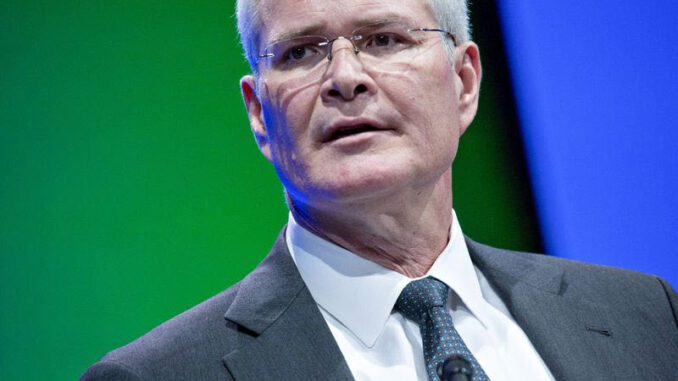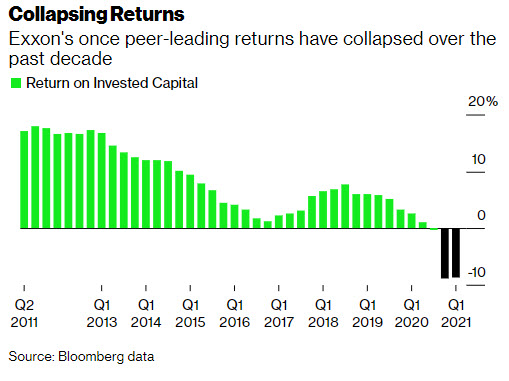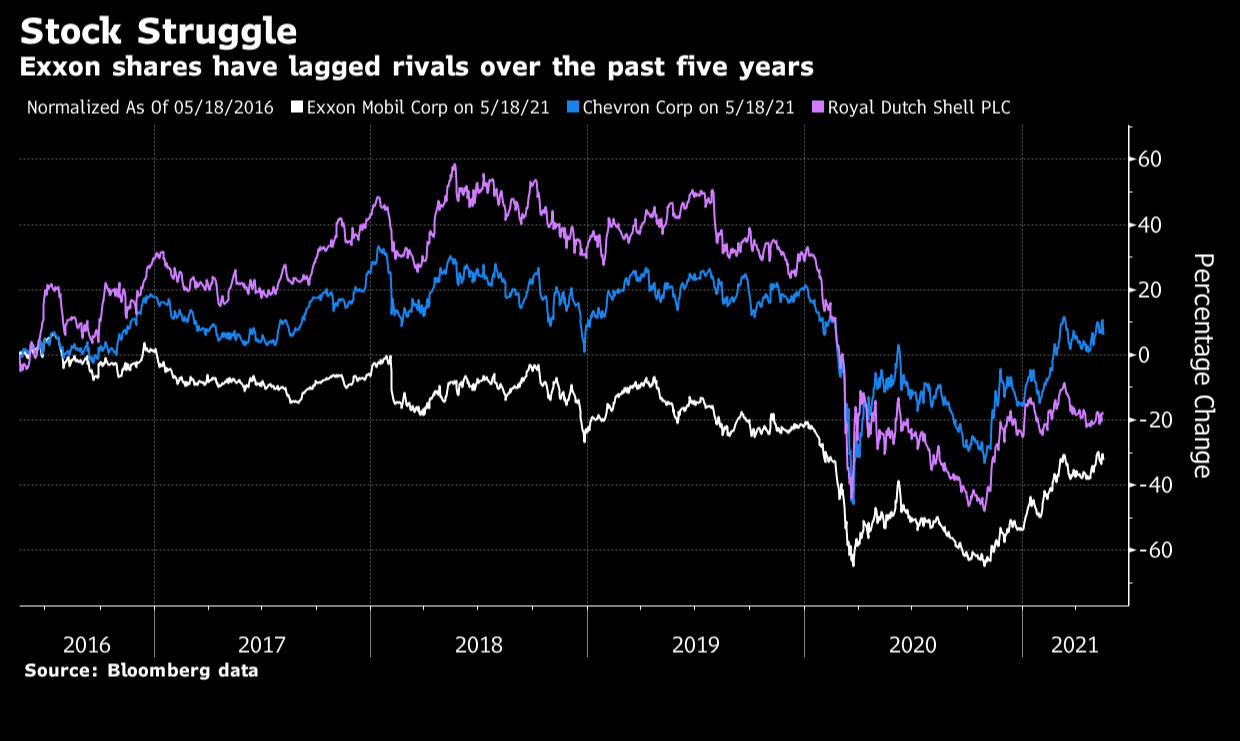
An unprecedented fight over who should sit on the board of Exxon Mobil Corp. is turning into a referendum on Chief Executive Officer Darren Woods as a decades-long struggle by climate campaigners comes to a head.
Activist investor Engine No. 1 LLC wants to replace one-third of Exxon’s board in an effort to force the Western world’s largest oil explorer to embrace a transition away from fossil fuels and end a decade of what it calls “value destruction.” Shareholders are set to gather — virtually — for their annual meeting on May 26.
The stakes are high. Under Exxon’s bylaws, a victory for any dissident director would mean an incumbent must step down, equating to a zero-sum proxy contest: of 16 candidates, only 12 will prevail. Any dilution of Woods’s influence over the board could derail his long-term plans and force strategic and tactical changes he has previously rejected.
Although Engine No. 1 hasn’t targeted Woods for removal, even a partial victory for the activist would be a serious, and perhaps fatal, blow to his leadership, according to Ceres, a coalition of environmentally active investors managing $37 trillion.

Exxon’s engagement with environmental activists was once characterized by a sense of bemusement — under former CEO Lee Raymond, Greenpeace protesters outside its annual meetings were offered donuts. But as worries about climate change have gone mainstream in the investment world, the clash has evolved into a confrontation over boardroom seats.

Climate concerns are are resonating more deeply with investors at the same time that Exxon’s status as a financial powerhouse crumbles after multiple corporate missteps, some of which preceded Woods’s elevation to CEO in 2017. Returns on invested capital are a fraction of what they were in Exxon’s heyday a decade ago and debt ballooned 40% last year as Covid-19 paralyzed economies and energy demand around the world.
Under mounting pressure and concerns over Exxon’s ability to pay the S&P 500’s third-largest dividend, the CEO slashed an ambitious $200 billion expansion program by a third late last year. It was a relief to some investors who had questioned both the cost and the need for such projects at a time when policymakers — and even rivals like BP Plc and Royal Dutch Shell Plc — are planning for the twilight of the petroleum era.
Still, Engine No. 1 says Exxon needs higher-quality directors who are willing to challenge management. Exxon missed key industry trends such as the shale revolution, “the shift to focusing on project returns over chasing production growth, and the need to gradually prepare for rather than ignore the energy transition,” according to the San Francisco-based activist.
After receiving early backing from major state pension funds, Engine No. 1’s campaign gathered momentum this month as two prominent shareholder-advisory firms, Institutional Shareholder Services Inc. and Glass Lewis & Co., threw their partial support behind the activist’s efforts. ISS wrote a scathing rebuke of Exxon’s climate strategy, saying the company had only taken “incremental steps to prepare for the inevitable.”
Top 20 shareholder Legal & General Investment Management, a previous critic of Exxon, is also backing Engine No. 1 and has pledged to vote against Woods. However, the voting intentions of some other major investors, such as Vanguard Group, BlackRock Inc. and State Street Corp. aren’t clear — all three declined to comment when contacted by Bloomberg News. Norway’s giant sovereign wealth fund said late last week that it would support the reelection of most Exxon directors, but not Woods, part of its long-standing push to separate the roles of CEO and chairman at Exxon.
Exxon said in a May 14 letter to shareholders its board “listens and responds to shareholder feedback,” but that Engine No. 1, founded only a few months ago, wasn’t interested in engaging and “is trying to replace four of our world-class directors with unqualified nominees.” The company added that the activist fund’s plans would “derail our progress and jeopardize your dividend.”
For its part, Engine No. 1 said Exxon refused to meet its nominees: Gregory Goff, former CEO of refiner Andeavor; environmental scientist Kaisa Hietala; private equity investor Alexander Karsner; and Anders Runevad, ex-CEO of power producer Vestas Wind Systems A/S.
Exxon did talk with another investor, hedge fund D.E. Shaw & Co., which built a stake in an effort to push for change. Those discussions led to the appointment of the new directors, including activist investor Jeff Ubben. The oil company has also announced new emissions targets, started a low-carbon business, and supported policies that will help technological innovations like carbon capture.
In some respects Exxon is in a better position that it was at the start of 2021. Its stock has rallied more than 40% as oil prices rebounded and lockdowns are eased. Engine No. 1 points to its involvement as the turning point, while Exxon claims the market is rewarding prudent cost cutting and high-return investments made over the last couple of years. The forthcoming vote will help to determine which side of the debate other investors lean toward.
“There’s a governance challenge at Exxon,” said John Hoeppner, head of U.S. sustainable investments at Legal & General. “How seriously is the current board questioning management’s business model? It’s important to add urgency to the debate.”
Source: Bloomberg



